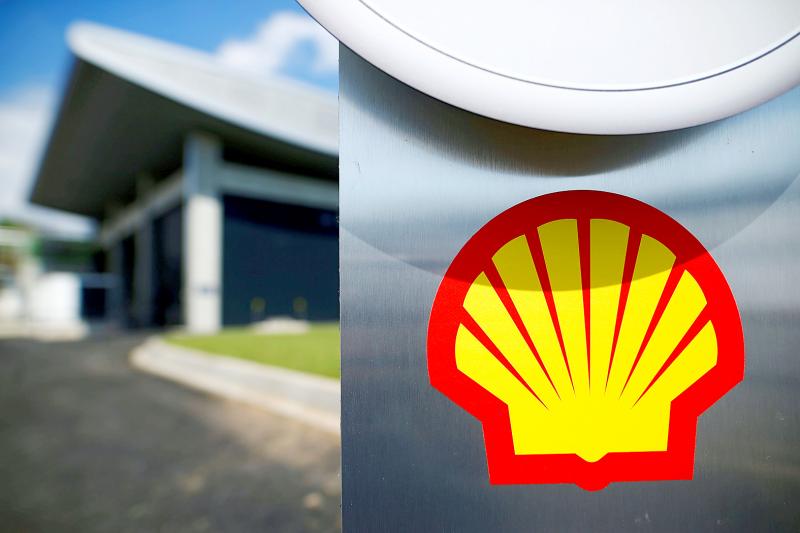Royal Dutch Shell PLC responded to external pressure by setting a more ambitious target for cutting greenhouse gas emissions from its operations, while reporting an increase in third-quarter profit that fell short of expectations.
Like its peers, Shell has been lifted by the surge in oil and gas prices, but nevertheless finds itself pulled in many different directions by people unhappy with its plans.
Dan Loeb’s Third Point Capital LLC is seeking the breakup of the energy giant, a move that would thwart its plan to keep pumping oil and gas as it embraces renewable energy.

Photo: Reuters
A Dutch court has also ordered the company to cut carbon emissions much faster than it had previously planned.
“This quarter we’ve generated record cash flow, maintained capital discipline and announced our intention to distribute US$7 billion to our shareholders,” Shell CEO Ben van Beurden said in a statement yesterday.
Combined with the more ambitious emissions target, “this is clear evidence of how we are accelerating our Powering Progress strategy, purposefully and profitably,” he added.
The Anglo-Dutch company set an absolute carbon-reduction target of 50 percent by 2030, compared with 2016 levels on a net basis. The new goal covers scope 1 and scope 2 emissions, which are directly under Shell’s operational control. It does not affect the bulk of the greenhouse gases resulting from Shell’s business — scope 3 emissions that are released when customers burn fuel.
Shell’s third-quarter adjusted net income was US$4.13 billion, up from US$955 million a year earlier, but well below analysts’ average estimates of US$5.42 billion. Cash flow from operations jumped to US$16.03 billion, compared with US$10.4 billion a year earlier.
Like its peers, Shell kept a tight lid on spending, despite surging profits. The company expects capital expenditure to total US$20 billion this year, down from previous guidance that went as high as US$22 billion.
TOTALENERGIES
TotalEnergies SE’s profit in the third quarter rose by more than expected, making the French oil and gas producer the latest beneficiary of high energy prices.
While an energy supply crunch is wreaking havoc on Europe’s economy, it is lifting the earnings of major producers to multiyear highs.
TotalEnergies’ adjusted net income rose to US$4.77 billion in the three months ended Sept. 30, a fivefold increase from US$848 million a year earlier, the company based in Paris said in a statement yesterday. That exceeded analysts’ average estimate of US$4.32 billion.
“The global economic recovery, notably in Asia, drove all energy prices sharply higher in the third quarter,” TotalEnergies CEO Patrick Pouyanne said in the statement.
The firm benefited in particular from its position as a world leader in liquefied natural gas, he said.
TotalEnergies’ capital expenditure is to remain unchanged from last year at US$13 billion this year.

CAUTIOUS RECOVERY: While the manufacturing sector returned to growth amid the US-China trade truce, firms remain wary as uncertainty clouds the outlook, the CIER said The local manufacturing sector returned to expansion last month, as the official purchasing managers’ index (PMI) rose 2.1 points to 51.0, driven by a temporary easing in US-China trade tensions, the Chung-Hua Institution for Economic Research (CIER, 中華經濟研究院) said yesterday. The PMI gauges the health of the manufacturing industry, with readings above 50 indicating expansion and those below 50 signaling contraction. “Firms are not as pessimistic as they were in April, but they remain far from optimistic,” CIER president Lien Hsien-ming (連賢明) said at a news conference. The full impact of US tariff decisions is unlikely to become clear until later this month

With an approval rating of just two percent, Peruvian President Dina Boluarte might be the world’s most unpopular leader, according to pollsters. Protests greeted her rise to power 29 months ago, and have marked her entire term — joined by assorted scandals, investigations, controversies and a surge in gang violence. The 63-year-old is the target of a dozen probes, including for her alleged failure to declare gifts of luxury jewels and watches, a scandal inevitably dubbed “Rolexgate.” She is also under the microscope for a two-week undeclared absence for nose surgery — which she insists was medical, not cosmetic — and is

GROWING CONCERN: Some senior Trump administration officials opposed the UAE expansion over fears that another TSMC project could jeopardize its US investment Taiwan Semiconductor Manufacturing Co (TSMC, 台積電) is evaluating building an advanced production facility in the United Arab Emirates (UAE) and has discussed the possibility with officials in US President Donald Trump’s administration, people familiar with the matter said, in a potentially major bet on the Middle East that would only come to fruition with Washington’s approval. The company has had multiple meetings in the past few months with US Special Envoy to the Middle East Steve Witkoff and officials from MGX, an influential investment vehicle overseen by the UAE president’s brother, the people said. The conversations are a continuation of talks that

CHIP DUTIES: TSMC said it voiced its concerns to Washington about tariffs, telling the US commerce department that it wants ‘fair treatment’ to protect its competitiveness Taiwan Semiconductor Manufacturing Co (TSMC, 台積電) yesterday reiterated robust business prospects for this year as strong artificial intelligence (AI) chip demand from Nvidia Corp and other customers would absorb the impacts of US tariffs. “The impact of tariffs would be indirect, as the custom tax is the importers’ responsibility, not the exporters,” TSMC chairman and chief executive officer C.C. Wei (魏哲家) said at the chipmaker’s annual shareholders’ meeting in Hsinchu City. TSMC’s business could be affected if people become reluctant to buy electronics due to inflated prices, Wei said. In addition, the chipmaker has voiced its concern to the US Department of Commerce